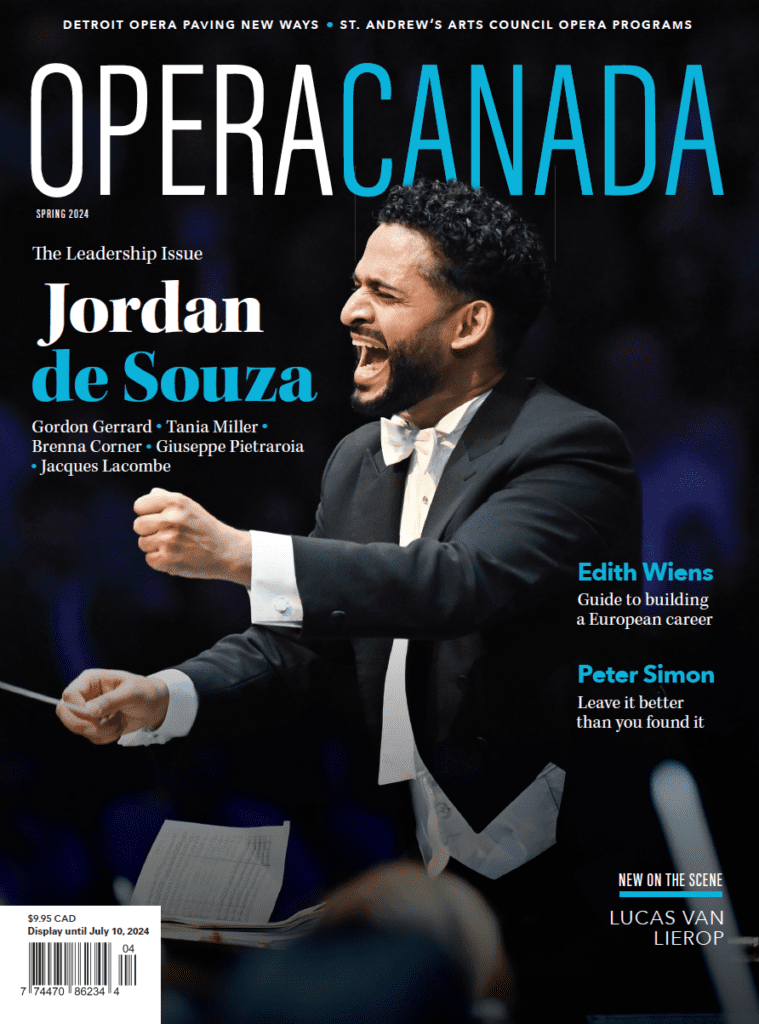In an exclusive interview on Nov. 2nd, leader of Canadian Opera Company (COC) and Opéra national de Paris Alexander Neef answered the questions we’ve been dying to ask since his move to France.
Q: How do you perceive the Canadian opera world versus that in France, regarding efforts to bring live opera back to the stage?
A: They’re two very distinctly different worlds and a lot of it has to do with the funding models of course, the size of the organizations, and I think also the general attitude of the audience. I mean what I found really remarkable here: before they locked us down, our attendance limit was 1,000. So putting on a show for 1,000 people in the audience actually makes sense. When I look at the gathering limits in Ontario at the moment, and even if I leave the economic considerations aside, it would be very difficult to open your theatre for that small a number of people.
Now of course it’s a different game here, too, but I would say that the biggest difference maybe is that you feel–at least in Paris, that might not be true for everywhere in Europe– people are still much more inclined to leave their house for entertainment when the government actually lets them. My impression with the Canadian landscape is that people are more reluctant to consider attending a live event. At this point, even if it was possible, even if we could open the theatre and have an audience and put on a show, I think, there seems to be a more important reluctance on the part of the audience.
And then of course economically spoken, [sic] the COC depends on revenues from tickets and fundraising to about 85% of the budget, which means we have to be very very careful to commit to a performance because we will only be able to make that work economically when people actually attend. So, if you have very strict attendance limits you already know you’re not going to make the money that you need to make in order to stay afloat. But even if there were no attendance limits, and I think that’s the big reluctance on the side of the companies at the moment, at least in the larger companies with important costs associated with putting on performances, the question is: even if we’re able to reopen our theatres and put on regular performances are people going to attend in sufficient numbers? One has to be very careful with those commitments because if you overcommit, the financial trouble caused by putting on a performance would be quite real.
Q: Given these substantial unknowns, what can a company like the COC realistically offer audiences in 2021, and how close would that programming be to a ‘main-stage’ lineup?
A: Let me take a step back–it’s all very dependent on, even if you can’t have an audience, how the gathering limits evolve. Right now, my understanding is that we couldn’t bring together an orchestra of 50, even without an audience to record content, for example. The numbers are significantly smaller. So, while we’ve been we’ve been offering virtual content pretty much since the first lockdown back in March, what we’re waiting to get to–and we were hoping to get to that before the reinforced measures were announced a couple of weeks ago–was actually to record content in the opera house, higher quality content.
We wanted to get away from the slightly worn-off charm of people performing for you from their living rooms. We thought it’s maybe time to embrace slightly–I don’t want to say higher standards because that was a very valid effort to bring content to people when the first lockdown happened back in March–but really to say, how can we be a little bit more ambitious with our content during a time when we can’t welcome an audience.
We have conceived of a three-day free concert series festival and they’re supposed to be recorded but that had to be delayed because of the reinforced lockdown measures. Pretty much the idea really was to start recording at the opera house, be it in the Richard Bradshaw Amphitheatre or on the stage of the Full Seasons Centre; start with small entities and then, as restrictions are loosened, grow to larger-scaled content. Right now, we simply don’t know when we can start doing that and then how fast we will be able to grow it.
Q: How will Paris Opera’s plans to reopen with its Ring Cycle be affected by recent lockdown measures implemented in French cities?
A:We’ve got two cycles in concert–one at the Opéra Bastille and one at the auditorium of Radio France. The first Cycle already falls into the confinement period so we’re proceeding with rehearsals in lieu of a recording that we were going to realize with an audience. Now we’re going to realize that without an audience.
We’re currently waiting for news on how the second Cycle would be affected. So, it’s a bit of a moving target right now but definitely continuing with rehearsals and definitely trying to get it to our audience, even if our audience can’t come into our theatre.
Q: What important qualities are needed in a new COC leader?
A: I’m trying to project myself into the role of what would have happened if I hadn’t left, right, what are the qualities that would have been required from me. I’ve been working in opera for 20 years [and] I’ve never worked so much day-to-day. Usually, our modus operandi is [that] there’s one season that you’ve planned a couple of years out and even while that is happening pretty much as planned, you focus on the future. Right now, because everything changes all the time, focusing on the future is really tricky–especially on an ambitious, larger-scale future because you’re constantly changing the plan for like next week.
So, I think that that is going to be, I would say a tendency in the business for the next little while. And it’s not so much different in Paris, actually, that there has to be the day-to-day, it has to get a lot more attention. If you want to call it ‘crisis management’ or just day-to-day business that needs much more care and attention because it’s not business as usual. And I think as a leader you kind of have to accept that and maybe your ambitions for three to five years–you can still try to reach them now but you might not be able to put them into place as fast as you want to because you’re too busy keeping it all together in the day-to-day.
Q: What can you tell us about your to-be-named successor at the COC?
A: I’m not sure that I’m much wiser than you at this point. Um, I think it’s reasonable to expect an announcement within a reasonable, reasonable timeframe now. But that’s really all that can be said.







